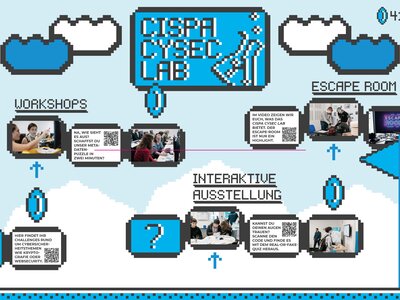IT-Security Know-How for Everyone
IT-Security Know-How for Everyone
“Science Outreach aims at making areas of academic research more accessible and fostering an interest in research topics.” This is how Andrea Ruffing, Head of Science Outreach at CISPA, explains the task of her team. An important pillar of Science Outreach is the CISPA Cysec Lab, where schoolchildren, teachers, students and the public can explore cybersecurity topics. In a playful manner, children from the age of eight are introduced to cryptography and machine learning and invited to explore these topics on their own. The opening ceremony for the laboratory at the Beckerturm in St. Ingbert was held in September 2022. However, Ruffing’s team have been conducting online workshops since late 2020.
“We also take our program into schools and participate in science festivals and trade fairs. Last year, for example, we took part in the Explore Science experience days. Our demos, such as the Password Cracker, the Escape Room and our crypto puzzles went down well with both younger and older audiences,” says Ruffing. Another visit to Explore Science is in her diary for 2023. In the CISPA Cysec Lab itself, participants first learn about a topic and then try out their newly acquired knowledge in small groups – all in one day.
While the focus for children is on playing and experimenting, parents primarily want their children to learn about innovative technologies at an early age. “This quickly leads to questions concerning degree programs and career orientation,” explains Ruffing, who has answers at the ready. In cooperation with CISPA, Saarland University offers four degree programs in cybersecurity, which Ruffing’s team are promoting on a regular basis. “We invite former students to talk about their experiences. We also approach prospective students, offering them the opportunity to get a taste of IT topics and to learn about the transfer of knowledge to society.”

To young researchers, the Science Outreach team appeals with events such as the Summer School. At this event, CISPA researchers offer a glimpse of their work, hosting workshops and giving presentations. The Summer School also gives young researchers an opportunity to network with colleagues and to exchange ideas about their work.
But Ruffing also wants to reach out to those who do not see themselves as having a (near or distant) future in cybersecurity. In citizen events such as the Open Campus Day, the CISPA Roadshow or the Summer of Cybersecurity, her team and CISPA researchers provide IT security knowledge for everyone – no prior knowledge necessary. Even everyday questions, concerning smartphone security for example, are addressed in this context.
In citizen science projects, the public can make their very own research contributions by documenting the web security incidents they have experienced and sharing them with Ruffing’s team. “In doing so, people are actively helping to advance the scientific knowledge process. This data is very interesting for us and the respective research group, while the public can take a glimpse behind the scenes and get a better understanding of how science works.”
Here you can download the complete Zine Nr.